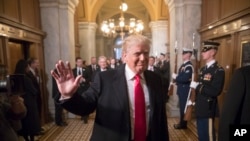A speech by President Donald Trump will be the highlight of this year's Conservative Political Action Conference (CPAC), energized by Republican control of the White House and Congress for the first time in 10 years.
This year's gathering of thousands of conservatives is taking place at a Maryland hotel, just across the Potomac River from Washington, and it was controversial even before the gathering started.
Organizers Tuesday canceled a keynote speech by Milo Yiannopoulos, who resigned as an editor of the right-wing Breitbart News website Tuesday amid controversy.
A darling of the far-right, Yiannopolous fell out of favor with mainstream conservatives because of recently unearthed remarks in which he appeared to endorse sex between men and teenage boys who had not reached the age of consent.
His comments also cost him a book deal. Yiannapolous called his own remarks "outrageous" and condemned pedophilia.
But his presence would have been a huge distraction from the main purpose of CPAC: rallying conservatives of all strains to back the Trump agenda.
Not all have endorsed Trump's brand of conservatism, and his past appearances at CPAC have drawn mixed reactions. Many of his stated and past positions on issues put him at odds with conservative orthodoxy.
3 kinds of conservatives
But CPAC leader Matt Schlapp told VOA that there was an "alive and vibrant" coalition made up of three kinds of conservatives: those who care about the culture, those who simply want less government and lower taxes, and others who say the country needs a strong defense.
Schlapp said all were discouraged about what has been happening in Washington in recent years. "They just feel like no matter how many elections they win, they lose ground, and government grows and taxes increase," he said.
While conservative Republicans gather in Maryland, opposition Democrats will meet in Atlanta to choose a new leader of the Democratic National Committee.
Former Obama Labor Secretary Tom Perez and U.S. Representative Keith Ellison of Minnesota are the front-runners to lead the party, which is trying to pick up the pieces after November's election losses.
The moderate-voiced Perez has the backing of more mainstream Democrats, while the outspoken Ellison is supported by the more liberal elements of the party.
But all sides say the Democrats need a leader who can harness the anger and energy coming out of anti-Trump protests and put the party back in control of Congress in next year's midterm elections.




